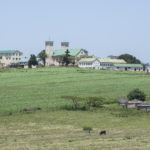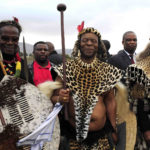Counter claims slow land reform
A small KwaZulu-Natal farming community waits anxiously and impatiently as the land reform department drags its feet and bungles their claims.
Author:
16 January 2019

Mbongeleni Sikhakhane, 65, has dedicated most of his life to trying to get back the land of his forefathers in the Ulundi Local Municipality, which falls under the Zululand District Municipality in northeastern KwaZulu-Natal.
His biggest fear is that he will die waiting as land reform moves at a snail’s pace.
“I know that when I die, no one will follow up on this claim the way I have. And that scares me, because my grandchildren will be left poor, just like I was.” said Sikhakhane.
Born and raised in the small farming community of Babanango, near Melmoth, Sikhakhane’s is one of about 52 families who lodged the Babanango Land Claim at the provincial Department of Rural Development and Land Reform in 1998.
Related article:
Babanango is a sleepy town just outside Ulundi in the heart of Zululand. It is made up predominantly of farming communities, who live on land that spans hundreds of kilometres.
According to activists, there were people living on the land when white farmers took it over. Those people became labour tenants, and insist that they are dispossessed landowners.
The families’ claim involves 52 farms, including Mooihoek, Bokkie, Rooipoort and Panda’s Graaf.
“I was born here. My parents worked on a farm in the area,” said Sikhakhane.

He said that through the claim the community lodged in 1998, he now understands the issues of the land. “We claimed again in 2016 and we are still waiting.”
The community feels the department is not prioritising their claim, according to Thabiso Mbhense, a lawyer from the Legal Resources Centre who is helping the families to try and push the office of the Land Claims Commission (the land reform department) to rectify the matter.
Explaining the history of the claim, Mbhense said the Babanango community nominated community member Moses Zungu to lodge the claim on their behalf. But Zungu died before the claim could be finalised.
Because he had been handling their claim alone, the community was left in the dark and only discovered later that it had been combined with another claim, one by the Emcakwini Community Trust. When investigated, it was discovered that the amalgamation of the two claims had been done without the consent of the Babanango community.
Related article:
“Around 2005, Moses Zungu passed away before the Babanango community’s land claim was finalised. According to the Babanango claimants, after Zungu died the regional land claims commission in KwaZulu-Natal consolidated their land claim with the Emcakwini land claim. They [the claimants] have advised that they have never given consent to the commission to amalgamate their land claim with the Emcakwini land claim,” said Mbhense.
He said the commission transferred the Babanango claim to the Emcakwini claim as a result of the amalgamation, creating a number of problems.
“Around 2014, Babanango land claimants decided to address letters to the chief land claims commissioner, the public protector and the president of the Republic of South Africa,” said Mbhense.
On 29 April 2014, the chief land claims commissioner wrote a letter to the Babanango land claimants advising them that the regional land claims commission in KwaZulu-Natal had conducted an investigation, which found that “the process of consolidating the claim was not done correctly”.

“Some claimants discovered that the farms against which a separate land claim was lodged had been settled under Emcakwini without their knowledge and consent,” said Mbhense.
New Frame has seen correspondence with the public protector at the time, the Presidency and the land reform department, wherein the community requested intervention on the matter.
“The Babanango land claimants were satisfied with the suggestions made by the chief land claims commissioner,” said Mbhense. He added that the community were promised that the verification process would take seven days.
But this did not happen.
“The Babanango land claimants are worried and feel that the process of verification is at a snail’s pace,” said Mbhense. “They hoped that their land claim would be processed speedily and that they would be given secure tenure and ownership on the land.
“The officials of the regional land claims commission [of KwaZulu-Natal] conducted verification until August 2016. Since then, the verification has never been done.
“This case is no different from other claims which are plagued by delays. People have lodged claims and the department is slow on processing their claims. A number of claimants have died before their claims were finalised,” he said.

Red tape and overlaps
Bhekithemba Mchunu, who sits on the coordinating committee of the Babanango Land Claim said the community was shocked to find that their claim had been amalgamated with the Emcakwini Trust without the community’s knowledge or consent.
“In 2007, the community wanted to follow up on the claim lodged and the department did not want to talk to us because we were not a legal entity. It said it dealt with Emcakwini,” said Mchunu.
Later, when the community met with the Department of Land Affairs in a bid to come up with an amicable solution, people were advised to go and identify their homesteads, Mchunu said. “They advised us to form a communal property association, which would be a legal entity, that would allow the trust to be moved to the communal property association.”
The community is still in the process of forming the entity. “We might even find ourselves grabbing land like [Economic Freedom Fighters leader Julius] Malema is encouraging, because of the lack of manpower and political will,” said a frustrated Mchunu.
Related article:
Complicating the matter further is the fact that, although the claims are different, there are commonalities.
“These are two separate claims, the only similarities is that we are claiming for the same plot of land. The land claimed by Moses is bigger than ours, he claimed 52 farms and we are claiming 38 000 hectares, which lies within the 52 farms.” said Emcakwini Community Trust chairperson Eric Buthelezi.
He said the trust had done some research and the farms that could no longer be used as farmland, only as residential sites, were left out of the claim. “Of the 38 000 hectares claimed, the trust has been able to get back 24 000 hectares,” he said.
Babanango’s local chief, Inkosi Nomvula Ntombela, said she was aware of the claim and encouraged the claimants to come to her, as she could provide valuable information that could strengthen their claim.
Related article:
“They can come to me, I will help them. I have all the history of Babanango, I know all the graves and the people buried in them. I have a list of all the families and the records to prove where their great-great-grandfathers are buried,” she said.
Attempts to get comment from the department failed, but according to a letter obtained by New Frame, Chief Land Claims Commissioner Nomfundo Ntloko-Gobodo conceded that the claim was processed incorrectly.
The letter says: “There are land claims under research where properties against which the claim was lodged and registered have been consolidated under the Emcakwini land claim. The investigations have further found that the process of consolidating the claims was not done correctly. Some claimants have discovered that the farms against which a separate claim was lodged, have now been settled under Emcakwini without their knowledge and consent.”
The department said it needed to finalise research into all the overlapping claims with Emcakwini and that it would help transfer the land to the correct people once it had held a workshop with all the affected parties and come to a conclusion.





